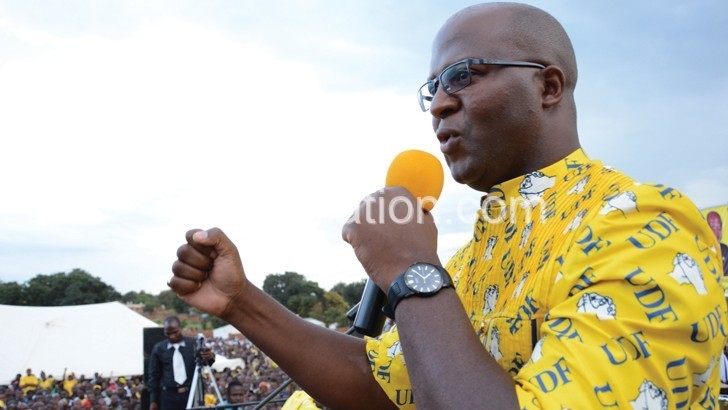Atupele faults DPP leadership
In the heat of the May 21 2019 Tripartite Elections campaign, United Democratic Front (UDF) presidential candidate Atupele Muluzi has hit at the country’s leadership for failing to listen, implement and deliver.
Muluzi, who is Minister of Health in the Democratic Progressive Party (DPP) administration under President Peter Mutharika, said the poor leadership is the reason the country is still struggling with high poverty levels.

Speaking in Mzuzu yesterday when he endorsed the National Youth Manifesto being championed by the Youth Decide Campaign, the UDF torchbearer said Malawi needs a leader who listens to people.
He said: “The biggest challenge we have had is that the leadership has not been listening to Malawians and focusing its intention on implementation, delivery and demonstrating results.
“The core area that we are focusing on are based on these three pillars; ensuring we listen to Malawians, especially young people; being able to respond by providing the leadership; and being able to implement and demonstrate tangible results that begin to hold us leaders accountable.”
Muluzi, a son to former president Bakili Muluzi who governed the country from May 1994 to May 2004, said Malawians know the problems facing the country and what they want now are solutions.
He said: “The problem in Malawi is that leaders talk too much, but do not implement. Running government is serious business that needs someone to make tough choices and decisions and also be focused.”
Muluzi, who has served as Cabinet minister both in the People’s Party (PP) from 2012 to 2014 and DPP from 2014 to date, said his Cabinet experience has taught him what it takes to bring change, adding that change cannot come with one person; hence, UDF is promoting inclusiveness.
He said UDF has demonstrated that it can deliver, adding that alongside his running mate Frank Mwenifumbo, a member of Alliance for Democracy (Aford), they have already initiated programmes targeted to benefit the youth and the country at large.
Muluzi said UDF has helped secure K170 billion fund that will see businesses accessing loans and also jobs being created which will in turn contribute to the development of the country.
He said even if he does not make it as Head of State, entrepreneurs will still access the funds to do businesses and employ others.
“We just demonstrate commitment that this is about Malawi. It is not about UDF, it is about putting Malawians first irrespective of political party, tribe or religion,” said Muluzi.
He said Malawi needs to embrace information and communications technology to create jobs for the youth and also help the country develop, hence UDF is initiating a programme that will see five million households benefiting five million mobile phones to promote businesses, education, health, agriculture and so forth.
Muluzi has joined a chain of opposition leaders, including the country’s Vice-President Saulos Chilima, who fault the Mutharika administration for purportedly failing to develop the country.
Chilima and Malawi Congress Party (MCP) president Lazarus Chakwera, who served as leader of opposition in Parliament between 2014 and 2019, have also attacked the DPP administration for failing to curb corruption to develop the country.
But in his re-election campaign, Mutharika has dismissed his critics, stating that his administration has delivered on its promises.
Asked on the rationale behind Muluzi’s sentiments when he was serving the same government, UDF spokesperson Ken Ndanga said there has been an outcry against favouritism, nepotism, tribalism and all sorts of ‘isms’ in the country.
He said: “We want to do away with these. We don’t want to leave people out because they belong to another party or group. As long as someone has the potential to deliver, we want to help in running government.”
But Ndanga was coy when further asked whether the DPP’s apparent poor leadership is the reason UDF did not form a coalition with the governing party for the imminent elections, only saying “UDF is a strong party on its own and working with other parties is just a bonus”.
However, University of Livingstonia political scientist George Phiri described Muluzi’s stand on the country’s leadership as a clear vote of no confidence in Mutharika.
He said by speaking against things that are going wrong, Muluzi does not want to associate himself with how the government has been run.
Said Phiri: “It is a fact that government has failed to transform the country. Priority should have gone to empowering the youth and women because they are in majority but it’s the opposite in Malawi.”
During the meeting, Youth Decide Campaign team leader Charles Kajoloweka hailed the UDF manifesto for tackling issues that the youth are pushing for and promoting the welfare of the youth.
He called on the UDF leader to promote the national youth manifesto so that the youth are part and parcel of the decision-making process if UDF wins the May 21 Tripartite Elections.
The Youth Manifesto calls for the creation of 500 000 jobs every year, 10 percent share in government contracts and support for the youth in accessing loans to manage contracts.
It also calls for abolishment of quota system for selecting students to public universities within the first 100 days. The youth want students to go to university by merit noting that a number of young people are suffering because of the quota system.
Muluzi and Chilima, who is contesting the presidency on the ticket of the country’s newest registered political outfit UTM Party, are members of Mutharika’s Cabinet aspiring for the office of President.
In the May 20 2014 Tripartite Elections, Muluzi finished fourth with 717 224 votes. Peter Mutharika, who paired with Chilima as his running mate picked from the private sector where he was Airtel Malawi managing director, triumphed with 1 904 399 votes against 1 455 880 for second-placed Chakwera. Then incumbent president Joyce Banda of PP, who had ascended to the presidency in line with constitutional order after the death of Bingu wa Mutharika in 2012, finished third with 1 056 236 votes.





